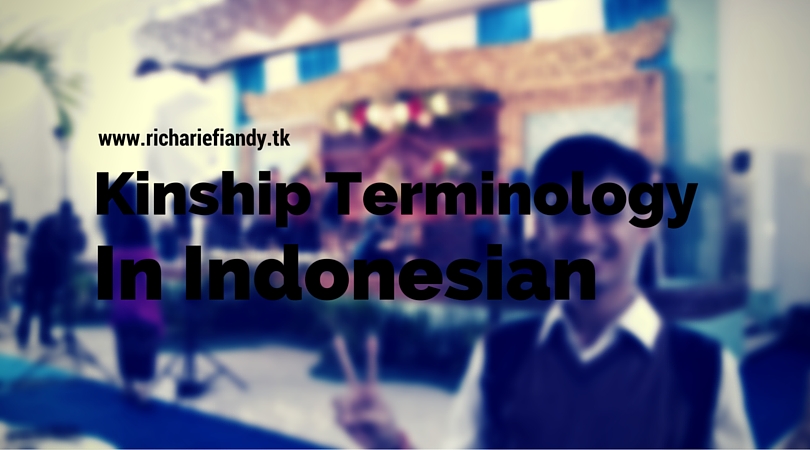
What makes kinship terminology in Indonesian different?
From English, of course. Well, suffice to say that Indonesian kinship terminology is heavily based on ‘seniority’ instead of gender, even though gender does affect the terms to some extent. But what makes kinship terminology in Indonesian a little bit more complicated is the influence of local languages. Kinship terminology in Indonesian is colored with local elements.
Our siblings
Let’s start with sibling. The Indonesian word for sibling is saudara. It’s gender neutral. Putting laki-laki (male) or perempuan (female) after saudara will make it into brother or sister, respectively. However, many Indonesians use the word saudara not only for siblings, but also anyone related to them, such as cousins and other relatives. Indonesians usually prefer adik and kakak when referring to siblings; adik for younger siblings and kakak is for older siblings. Once again, putting laki-laki and perempuan after the words makes them more gender specific, and as you can see, Indonesians distinguish (blood) siblings based more on how old they are relative to you instead of their gender.
There are some alternatives of calling kakak (not that many with adik, presumably because Indonesians tend to pay more attention to words they use for older people rather than to the younger ones) in some local languages and many are gender specific. In Javanese, mas and mbak are used for older brother and sister, respectively, while in Sundanese they have aa/akang and teteh. In Minang language, they have uda (older brother) and uni (older sister), while Malay Indonesians have abang and kakak; yes, the same kakak used in Indonesian language is actually older sister in Malay.
Parents and their siblings
If you know Indonesian, you probably know that bapak means father and ibu means mother. Do you know that Indonesians also use other terms? Ayah, papa, abi, babe, are all alternatives for bapak. The word papa is from the influence of Romance languages, abi is Arabic, and babe is Betawi language (influenced by Persian?). Meanwhile bunda, mama, ummi, and emak are alternatives for ibu. Of course different local cultures will use different words.
Parents’ siblings in Indonesian is actually simple. Aunt is bibi (Malay) or tante (Dutch) and Uncle is paman (Malay) or oom (Dutch). They seem to be gender specific, but not age specific, right? Well, that’s true, but don’t forget, some Indonesians use local languages with more specific terms. In Sundanese, your parents’ brother and sister are mamang and bibi, but your parents’ sibling is just uwak. In Javanese, your parents’ older brother is pak de and your parents’ older sister is bu de, while your parents’ younger brother is pak lek and your parents’ younger sister is bu lek.
At least in Indonesian, Javanese, and Sundanese, our parents’ siblings are distinguished based on the gender and (to a certain extent) age relative to the parents. However, in other languages of Indonesia, they also distinguish whether the sibling is from the father’s side or mother’s side.
Kinship terminology for?
Indonesians use kinship terminology not only to call relatives. We extend the use of the terms for people who are not family. You might know from this post and this post that these terms are also used as pronouns.

I will describe our North Moluccan Malay kinship.
Many kinship terms are basically Malay. Papa, mama, kaka, ade, tete (kakek), nene, and cucu (we have “dano” for cucu as well). For parent’s siblings we do have and use words like paman/om or bibi, but majority of us still use three words that divide them by relative age. Three words that we use are Malay, but they mean completely different. Muda for parent’s younger sibling, tenga for parent’s “middle sibling”, and tua for parent’s elder sibling. In our families (I’m from Tidore descent), we also use “jojo” for muda.
Also, for nephews/nieces we have a word as ponakan, but again we not always refer them as ponakan. Sometimes, we refer them as kaka pe ana (elder sibling’s child) and ade pe ana (younger sibling’s child).
And, cousins. We only use spupu for cousins in general, but we still do divide cousins by “how many times”. First cousin (parent’s sibling’s child) is called “spupu satu kali”, second cousin (parent’s cousin’s child) is called “spupu dua kali”, and so on. These terms are still dominant.
And, salam kenal Richard.
Hi Muhammad Hidayat,
Thank you for your complete description of North Moluccan Malay kinship system. It seems that you have extensive knowledge in the area. I think we all in Indonesia share the same kinship system. Of course, this is just a conjecture since I do not really master this particular field of study. Are you an anthropologist?